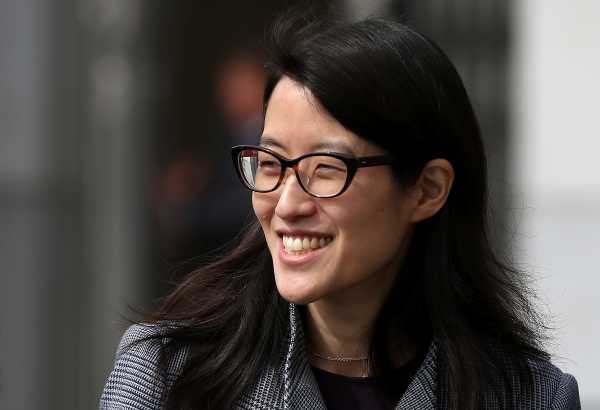
When the men at the venture capitalist firm Kleiner Perkins Caufield & Byers discussed meeting up at the club for a night out, for a ski weekend at Vail, or for a private dinner with firm partner Al Gore, Ellen Pao — a junior partner at the time — wasn’t invited.
Back in 2005, when she joined KPCB — one of the most powerful VC firms in the world at the time, with early investments in Netscape, AOL, Amazon, and Google — Pao had been hopeful that her stellar credentials would help her succeed. She had an electrical engineering degree from Princeton, Harvard degrees in both law and business, and a work ethic that involved no more than four to six hours of sleep a night.
Instead, she claims she was shut out of meetings, undercut by colleagues, and generally blackballed after she ended a brief fling with a co-worker who lied to her about being separated from his wife, according to her book. Pao brought a lawsuit against her employer claiming discrimination and asking for $16 million in partial damages for lost wages, plus carried interest from investments profits.
She lost the case. But then something unexpected happened: Women and minorities from all corners of the tech world began to speak up, telling their own stories about discrimination and harassment.
Pao’s new book, Reset: My Fight for Inclusion and Lasting Change, is the story of her personal and professional experience in Silicon Valley. After the trial, Pao co-founded “Project Include” — a nonprofit advocacy group that works with companies to improve diversity. She is also a diversity and inclusion activist at the Kapor Center for Social Impact, an organization that supports early-stage startups, many of which are founded by women and minorities, with the aim of making it easier for them to enter the tech sphere.
I spoke with Pao about what exclusion looks like in Silicon Valley, what advice she has for women and minorities who face discrimination at work, and why “leaning in” doesn’t always work. Our conversation has been lightly condensed and edited for clarity.
Hope Reese
What kind of obligation, if any, do women and minorities have to speak up about discrimination they face at work?
Ellen Pao
You know, it’s complicated. I had this idea that I owed it to everybody. I’ve had so many opportunities, I’ve been so privileged — so if I can speak up for all those people who need their jobs, or that don’t have a platform, or are so introverted that they can’t raise these issues, it felt like I should do it. But it’s also hard to say that women who experience bias and end up having to do all of the second-level work — who already work more hours and are underpaid — have the additional obligation of helping other people who are experiencing similar bias and discrimination.
The requirement is to not put down those people who are speaking up, to not put down the experiences of others that you might not be as similar to. To try to be empathetic. And if you’re not going to be supportive, to not say anything negative.
Hope Reese
Since you spoke up about discrimination at KPCB, so many women have come forward with their own similar stories that it was dubbed the “Pao” effect. Did you have any role models when you were considering bringing a lawsuit against the company?
Ellen Pao
I spoke with several women to get their experiences. They were women who had sued — mostly investment banks — big, powerful entities, and usually in a public way. I asked what the experience was like, if they would recommend this or had any advice for me. For the most part, they all said don’t do it. It’s not something that you’re going to benefit from financially [because of legal costs]. Your career is going to be completely sidetracked, if not decimated, and it causes a lot of personal stress, emotional stress, and physical stress — all of that is a huge cost.
For me, what was really powerful was hearing that even though they each had gone through all of that pain and suffering, they would do it again. That lasted with me. But they said you have to be so strong, and so committed, and people will doubt you.
Hope Reese
Sheryl Sandberg’s book Lean In calls on women to stand up for themselves, to take a seat at the table, to assert their rights in the workplace. And the Anne-Marie Slaughter version emphasizes that the whole system should change — that only by addressing fundamental structural inequalities will women rise to the top, professionally. Are these theories compatible?
Ellen Pao
I think Sheryl has come around to [the Slaughter model], in version 2.0 of Lean In. She’s talked about men speaking up, taking the lead, and driving change. It’s hard to criticize anyone who is speaking up and pushing for change. I think Sheryl had a very important role in calling out the problem as one of — if not the — leading businesswomen in the world. It was so important to hear from her that there are these problems.
Hope Reese
But you also write that even when you did take the advice to “lean in,” you were met with a lot of resistance. …
Ellen Pao
Yeah, it doesn’t always work. You can be blocked again. Or if I’m not even in the room, I can’t get a seat at the table. I don’t even know the meeting’s going on. I’m not even on the same planet, because there’s just this totally other set of activities going on that I’m being excluded from that I never see. I knew about the all-male ski trip. I knew about several dinners. But I don’t know what else happened that was all-male, because I wasn’t invited.
Hope Reese
Sarah Lacy, founder of PandoDaily, said that “what weakened support for Ellen was this idea of there was no massive smoking gun. There were just these constant micro indignities, these constant exclusions.” Can you talk about this? Can women and minorities have faith in the system protecting them, even if there isn’t a “smoking gun”?
Ellen Pao
My trial was hard because there was so much of Kleiner PR kind of muddying the facts and the events portrayed in the press, so it was hard to parse through all of that noise, but one very clear example was I had a performance review. Then [KPCB managing partner Ted Schlein] came in and gave a negative review for me in order, I believe, to show that I needed to be pushed out of the firm. So there were things that were pretty blatant, but it’s not like somebody did some overt form of bias.
I also look at all of the women who were not promoted and all of the men who were promoted, and I think that is pretty blatant, when we all had more experience than any of the men. We had more average education, mostly better schools.
Hope Reese
It seems that awareness has been raised about bias in tech. But what about companies that do one-off diversity training or anti-bias programs? Are they effective? Or are you worried that these are easy ways out?
Ellen Pao
I am worried. I think there have been so many women and men who have spoken up in the last five years to get us to this point where most people and the press understand the problem of bias in tech, and the next step is to take that awareness and turn it into meaningful change.
There are tepid diversity initiatives around the one-off training, or talking at a conference that’s targeted toward women in tech, or bringing in a few people from underrepresented groups and highlighting their hires within an organization. But the real change has to be comprehensive. It has to include everyone — not just women. When you are only including one group, that’s not real inclusion. It’s not the one-off checkbox activities — it’s making inclusion part of your culture, part of everything you do, and making everybody feel like they’re included and that they belong.
And the third way of making sure this happens is through metrics, because they can be used to hold people accountable. Is everybody included at all levels of the company across all different functions of a company? And not just in hiring but also in promoting and reviews and being given opportunities to do projects or to speak and get visibility, or you name it.
Hope Reese
Former Google employee James Damore wrote a memo citing “biological causes” as the reason for underrepresentation of women in tech. What does this case say about tech, or Google?
Ellen Pao
In general, having people who believe that others, whether they be women, or people of color, or women of color, or someone who’s older or someone who’s disabled, that they are unequal in their ability to contribute in their experience and the value of their education is extremely toxic. And I think there are people who think you have to lower the bar to bring different groups in to build diverse teams. And we know that’s not true. And I think if you value inclusion and fairness, these people need to be trained to change their behavior and perspectives, or they need to leave.
Hope Reese
There’s also been a recent pay gap discrimination lawsuit against Google. Do you think this is another result of women starting to speak up? Do you think their concerns will be heard?
Ellen Pao
It’s another level of pressure on companies. What we’ve seen in the last few years is the public pressure of reputation and that impact of negative views of a company’s treatment of women and other represented groups as a factor in whether or not people want to work or stay at that company. At the Kapor Center, we did a whole set of research about why people leave companies. And we found unfairness is a leading cause. And it causes, like, $16 billion of turnover each year.
If you look at how people are thinking about the pay gap, it’s often very opaque. People do these pay equity studies and they say, “Oh, we’re this many million dollars apart, and now we’ve fixed it.” But nobody ever understands what that process looks like, and how a calculation is made, and whether there’s meaningful lasting change in how it’s done to correct for the problem, or if they’re just throwing a little bit of money at the problem.
So I think what we see here with this litigation, and it could be it’s Google, but it could be many other companies, is people saying, “We have had enough, and we want to be paid what’s fair.”
Hope Reese
You were previously the CEO of Reddit, a social platform where people can be anonymous, which also poses the potential for harm like trolling and abuse. What’s the role of platforms like this — if any — to prevent this kind of behavior?
Ellen Pao
There’s a huge responsibility on the part of these platforms to protect their users. Whether it’s protecting their privacy from being doxxed and harassed, or protecting them from being bullied off the platform, or protecting them from being encouraged to kill themselves, harassment takes many different forms.
In this day and age, it’s not necessarily confined to that one platform. It can be online, it can be offline, it can be people working on different platforms in a coordinated way. I think there’s a responsibility to take ownership of your platform’s role in silencing different communities, mostly underrepresented groups. And it’s hard, I think, for a lot of platforms to understand that when the leadership does not belong to these underrepresented groups. They are not harassed in the same way, and that creates a limited experience that doesn’t help the product evolve.
Hope Reese
As you say, you were “privileged,” and had the financial means to bring on this lawsuit. What kind of advice do you have for women who are struggling at work but don’t have the resources or ability to be heard?
Ellen Pao
You really have to think about whether you’re in a place that you can succeed at. If there is systemic bias and you have the ability to leave, seriously consider that. There’s often this idea that if you change — if you just work a little bit harder, if you try to follow all the feedback — that change is gonna happen.
Hope Reese
But do you worry, though, if these women just decide to just leave a bad situation, those companies get away with the bad behavior?
Ellen Pao
I think there are enough women talking to each other and talking to people from other underrepresented groups that those companies will get their due. And I think when a woman leaves now, they no longer hold that in and blame themselves. I think they’re more cognizant of the death by a thousand cuts.
Hope Reese is a journalist in Louisville, Kentucky. Her writing has appeared in the Atlantic, the Boston Globe, the Chicago Tribune, Playboy, Vox, and other publications. Find her on Twitter @hope_reese.
Sourse: vox.com






